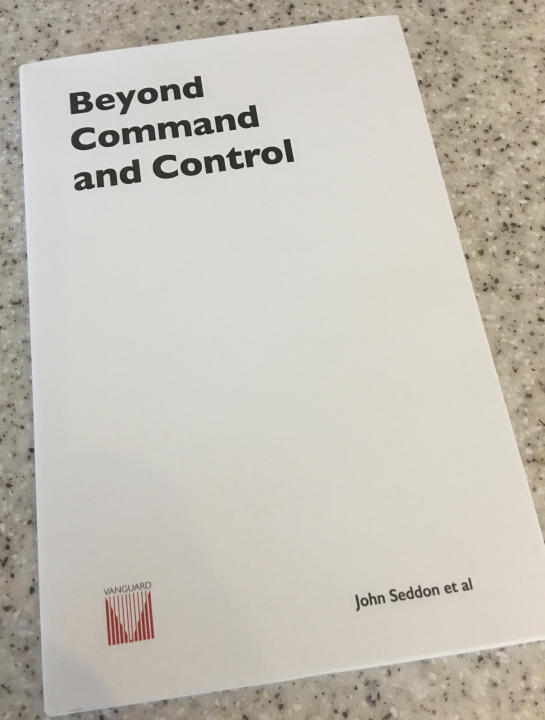Beyond Command and Control – A Book Review

John Seddon of Vanguard Consulting Ltd. kindly shared an advance copy of his upcoming new book “Beyond Command and Control” with me recently. I am delighted to be able to share my impressions of the book with you, by way of this review.
I’ve known John and his work with e.g. the Vanguard Method for many years. The results his approach delivers are well known and widely lauded. But that approach is not widely taken up. I doubt whether this new book will move the needle much on that, but that’s not really the point. As he himself writes “change is a normative process”. That’s to say, folks have to go see for themselves how things really are, and experience the dysfunctions of the status quo for themselves, before becoming open to the possibilities of pursuing new ways of doing things.
Significant Improvement Demands a Shift in Thinking
The book starts out by explaining how significant improvement in services necessitates a fundamental shift in leaders’ thinking about the management of service operations. Having describe basic concepts such as command and control, and people-centred services, the book then moves on to explore the concept of the “management factory”. Here’s a flavour:
“In the management factory, initiatives are usually evaluated for being on-plan rather than actually working.”
(Where we might define “working” as “actually meeting the needs of the Folks that Matter”.)
Bottom line: the management factory is inextricable bound up with the philosophy of command and control – and it’s a primary cause of the many dysfunctions described throughout the book.
Putting Software and IT Last
One stand-out section of the book is the several chapters explaining the role of software and IT systems in the transformed service, or organisation. These chapters excoriate the software and IT industry, and in particular Agile methods, and caution against spending time and money on building or buying software and IT “solutions” before customer needs are fully understood.
“Start without IT. The first design has to be manual. Simple physical means, like pin-boards, T-cards and spreadsheets.”
If there is an existing IT system, treat it as a constraint, or turn it off. Only build or buy IT once the new service design is up and running and stable. Aside: This reflects my position on #NoSoftware.
John echoes a now-common view in the software community regarding Agile software development and the wider application of Agile principles:
“We soon came to regard this phenomenon [Agile] as possibly the most dysfunctional management fad we have ever come cross.”
I invite you to read this section for an insight into the progressive business perspective on the use of software and IT in business, and the track record of Agile in the field. You may take some issue with the description of Agile development methods as described here – as did I – but the minor discrepancies and pejorative tone pale into insignificance compared to the broader point: there’s no point automating the wrong service design, or investing in software or IT not grounded in meeting folks’ real needs.
Summary
I found Beyond Command and Control uplifting and depressing in equal measure.
Uplifting because it describes real-world experiences of the benefits of fundamentally shifting thinking from command and control to e.g. systems thinking (a.k.a. “Synergistic thinking” Cf. the Marshall Model).
And depressing because it illustrates how rare and difficult is this shift, and how far our organisations have yet to travel to become places which deliver us the joy in work that Bill Deming says we’re entitled to. Not to mention the services that we as customers desperately need but do not receive. It resonates with my work in the Marshall Model, with command-and-control being a universal characteristic of Analytic-minded organisations, and systems thinking being reserved to the Synergistic– and Chaordic-minded.
– Bob
Further Reading
I Want You To Cheat! ~ John Seddon
Freedom From Command and Control ~ John Seddon
The Whitehall Effect ~ John Seddon
Systems Thinking in the Public Sector ~ John Seddon
